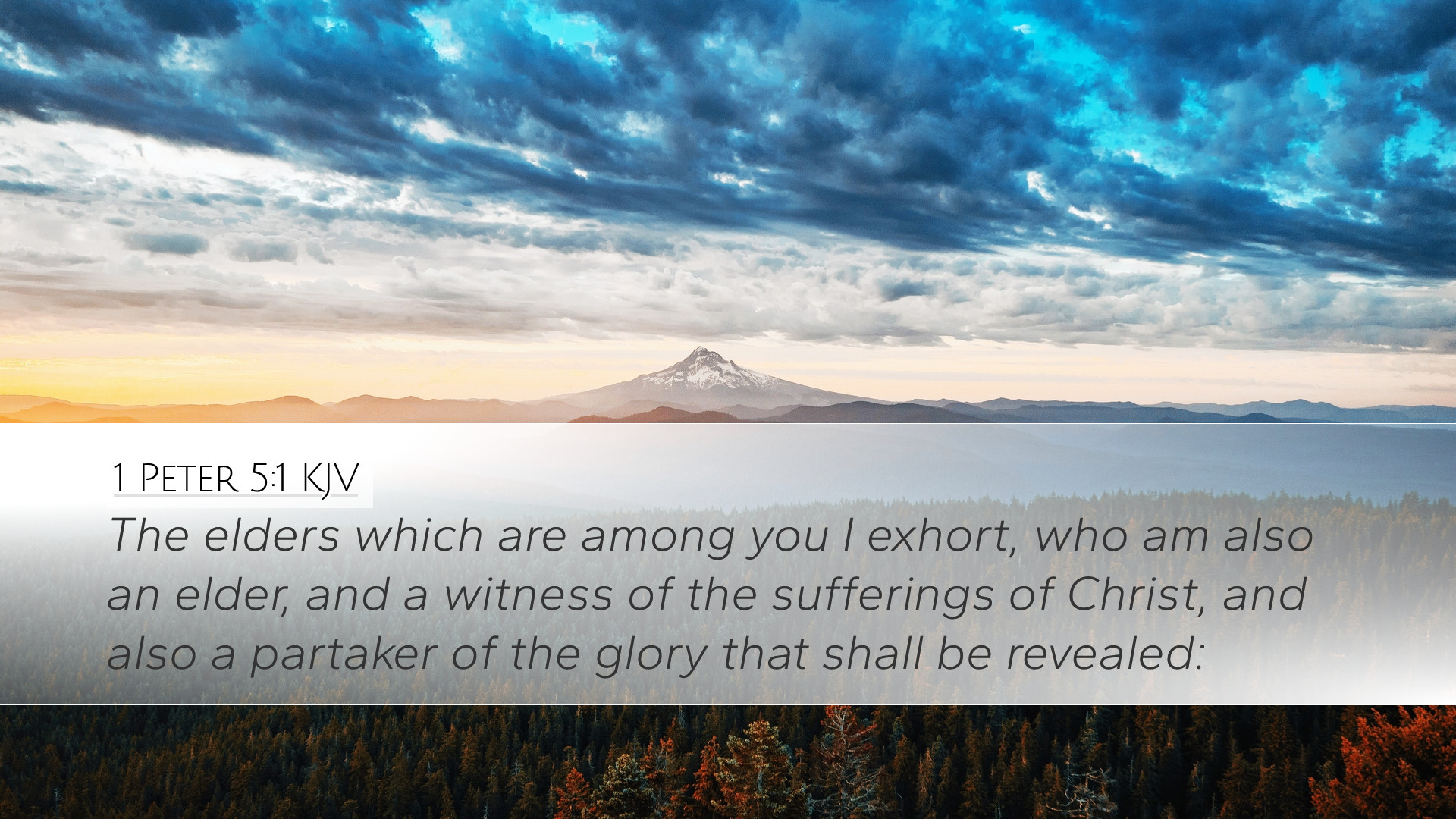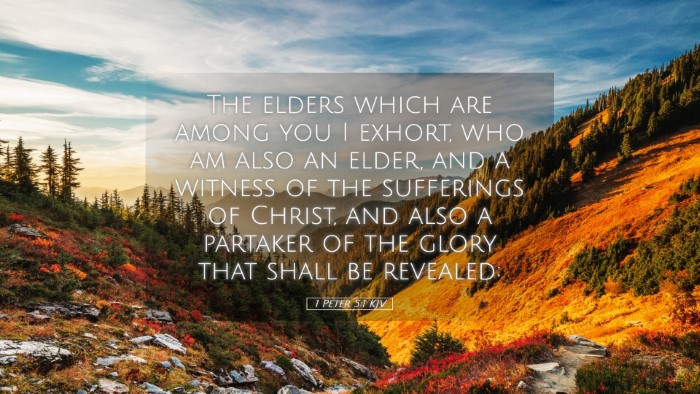Old Testament
Genesis Exodus Leviticus Numbers Deuteronomy Joshua Judges Ruth 1 Samuel 2 Samuel 1 Kings 2 Kings 1 Chronicles 2 Chronicles Ezra Nehemiah Esther Job Psalms Proverbs Ecclesiastes Song of Solomon Isaiah Jeremiah Lamentations Ezekiel Daniel Hosea Joel Amos Obadiah Jonah Micah Nahum Habakkuk Zephaniah Haggai Zechariah Malachi1 Peter 5:1
1 Peter 5:1 KJV
The elders which are among you I exhort, who am also an elder, and a witness of the sufferings of Christ, and also a partaker of the glory that shall be revealed:
1 Peter 5:1 Bible Commentary
Commentary on 1 Peter 5:1
Verse: 1 Peter 5:1 - "The elders which are among you I exhort, who am also an elder, and a witness of the sufferings of Christ, and also a partaker of the glory that shall be revealed."
Introduction
The passage from 1 Peter 5:1 serves as a crucial point in the Apostle Peter's epistle, where he addresses the elders of the church. The surrounding context emphasizes the guidance, accountability, and responsibilities of church leaders within the body of Christ. The insights derived from public domain commentaries enhance our understanding of Peter's intentions and the implications of his exhortation.
Contextual Analysis
This verse falls within a significant section of the epistle that deals with the conduct of church leaders and the faithful. Peter's approach is pastoral and personal; he refers to himself as "an elder," establishing his shared identity with the leaders he addresses. This appeals to the communal aspect of leadership and discipleship that permeates early Christianity.
Insights from Commentaries
1. Matthew Henry's Commentary
Matthew Henry emphasizes that Peter's self-identification as an elder is not just a title but a testament to his experience and humility. He writes:
- Shared Experience: Peter's connection as an elder lends weight to his exhortation. As a fellow elder and witness of Christ's sufferings, he relates to the trials the leaders may face.
- Role of Elders: Henry notes that elders are "to feed the flock of God." This feeding entails both spiritual guidance and moral accountability, reflecting Jesus’ personal instructions to Peter after the resurrection.
- Witness of Suffering: Peter’s mention of being a witness to the sufferings of Christ highlights the expectation that leaders will endure hardships, just as Christ did. Leaders are called to uphold the faith even in trials.
2. Albert Barnes' Notes on the New Testament
Albert Barnes provides a thorough exposition of the term "elder," explaining its origins and significance in the early church.
- Elder Defined: Barnes notes that the term elder (presbyteros) refers to individuals of maturity and experience in the faith. This role carries the responsibility of teaching, guiding, and protecting the congregational body.
- Importance of Experience: He concurs with Henry that Peter's status as an apostle enables him to offer insightful guidance to elders, rooted in his first-hand experiences.
- Anticipation of Glory: Barnes emphasizes how Peter not only recalls suffering but also speaks of the "glory" yet to be revealed, encouraging leaders to maintain hope and understanding that their labor has eternal significance.
3. Adam Clarke's Commentary
Adam Clarke delves into theological nuances and Greek etymology to illuminate Peter's words.
- A Call to Humility: Clarke underscores that Peter’s identification with the elders teaches that leadership should be exercised with humility and compassion, rather than authority or dominance.
- The Nature of Witness: Clarke points out that Peter's witness signifies both personal experiences with Christ and a broader witness of the transformative power of Christ's suffering, linking it to the mission of Elders today.
- Sharing in Suffering and Glory: He expounds on the duality of suffering and glory, indicating that faithful leadership will inevitably involve suffering but culminates in anticipation of God’s ultimate glory.
Theological Implications
1 Peter 5:1 intricately weaves concepts of suffering, authority, and community within church leadership. The Apostle Peter offers profound insights into the relational dynamic expected among church leaders. Some theological themes emerging from the commentary include:
- Suffering and Preservation: The suffering that leaders endure is not only personal but reflects the collective struggles of the church; this places leaders in a unique position of advocacy and representation.
- Encouragement for Leaders: Peter's reassurance about sharing in the glory serves as a reminder to leaders to endure trials with hope and faithful stewardship.
- Mutual Accountability: The communal aspect emphasized by Peter ensures that leadership is not isolated but rather involves mutual encouragement and accountability across the body of Christ.
Practical Applications
This verse and accompanying commentary provide several practical considerations for pastors, students, and theologians:
- Leadership Development: The model established by Peter encourages the development of mature leaders who share their faith journey and sufferings with those they lead.
- Creating Supportive Communities: Congregational leaders should create environments akin to Peter’s exhortation—where the struggles of leadership are discussed openly, fostering transparency and vulnerability.
- Focus on Eternal Perspective: Keeping a focus on the glory to come thus encourages leaders to endure hardship with joy, reminding them that their labor is not in vain.
Conclusion
1 Peter 5:1 serves as a significant exhortation for church leaders, anchored in a lifestyle of humility, service, and witness. Insights from commentaries by Matthew Henry, Albert Barnes, and Adam Clarke provide a rich understanding of the theological implications and practical applications of Peter's words, inviting leaders to embrace their roles with a deep awareness of their shared journey and eternal hope.


